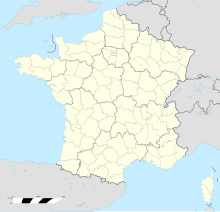 | Review waiting, please be patient.
This may take 7 weeks or more, since drafts are reviewed in no specific order. There are 1,447 pending submissions waiting for review.
Where to get help
How to improve a draft
You can also browse Wikipedia:Featured articles and Wikipedia:Good articles to find examples of Wikipedia's best writing on topics similar to your proposed article. Improving your odds of a speedy review To improve your odds of a faster review, tag your draft with relevant WikiProject tags using the button below. This will let reviewers know a new draft has been submitted in their area of interest. For instance, if you wrote about a female astronomer, you would want to add the Biography, Astronomy, and Women scientists tags. Editor resources
Reviewer tools
|
Camp du Valdahon Airfield | |||||||||||||||
|---|---|---|---|---|---|---|---|---|---|---|---|---|---|---|---|
| Summary | |||||||||||||||
| Airport type | Former Military Camp (Medium) | ||||||||||||||
| Operator | French Military | ||||||||||||||
| Serves | Valdahon, France | ||||||||||||||
| Location | Doubs, Franche-Comté, France | ||||||||||||||
| Coordinates | 47°09′29″N 6°20′26″E / 47.15806°N 6.34056°E | ||||||||||||||
| Map | |||||||||||||||
 | |||||||||||||||
| Runways | |||||||||||||||
| |||||||||||||||
The Camp du Valdahon Airfield (also known as Emergency Landing Ground E/Besançon-Valdahon) is apart of a French military camp established in 1907, located in Doubs, Franche-Comté. It served as an aviation site with observation balloons starting in 1909, and later supported runways and remained active through both World Wars and into the 1950s.[1]
History
editThe Camp du Valdahon was established in 1907 as a French military training area. Its aviation history began in 1909 with observation balloons, evolving during both World Wars into a functional airfield supporting military operations. By the 1950s, aviation activities ceased, though the site remains a military installation.[1]
This airfield was situated 26.5 km east-southeast of Besançon and approximately 1.6 km north of the village of Le Valdahon-du-Bas. While there is no documented evidence of German use, some clearing activities may have been in progress at the northeast end during the summer of 1943.[2]
Units
edit- 1st Regiment of Artillery (1st Division (USA))
- The 1st Regiment of Artillery has notable historical ties to Camp du Valdahon. During World War I, units from the 1st Field Artillery Brigade, including the 6th and 7th Field Artillery Regiments, underwent extensive training at the Valdahon military camp near the Swiss border. They trained using French artillery, such as 75mm field guns and Schneider 155mm howitzers, focusing on live-fire drills, aerial observation, and fire adjustment techniques. This training formed a critical part of the American Expeditionary Forces' (AEF) efforts, led by General Pershing, to build a distinct and capable American field army in Europe.[3][4]
- 1st Aerial Artillery Regiment (1er Régiment d'Artillerie Aérienne)
- The 1st Aerial Artillery Observation Group was stationed at Camp de Valdahon from November 1945 to February 1946. This unit played a significant role in French military aviation history and was later renamed the 21st Artillery Observation Group in 1950 before its dissolution on December 31, 1953.[5]
- 7th Artillery Regiment (7e Régiment d'Artillerie)
- In 1873, the 7th Military Regiment was established with its headquarters in Besançon. To provide troops with a dedicated space for shooting practice, it was decided to create a maneuver camp for each military region. The commune of Valdahon, with its expansive, wooded, and gently hilly terrain, was deemed an ideal location for conducting infantry, artillery, and engineering exercises.[6][4]
- 13th Engineer Regiment (13e Régiment du Génie)
- All Army units utilize the 3,600 hectares allocated to land forces, which includes maneuver areas, firing ranges, and other training facilities. These units specialize in engineering tasks such as clearing obstacles, demining, and constructing infrastructure like bridges. The regiment also operates advanced equipment, including drones and armored vehicles such as the Leclerc tank and the SPRAT (Pont Automoteur pour Renforcer les Troupes). The airfield plays a key role in logistical and training support, aiding preparations for overseas deployments, including missions in Mali.[7]
- On March 3, Flight “C” of the 800th arrived at Le Valdahon, Doubs, and found the camp in terrible condition, with deep mud everywhere. They were welcomed at the 17th Field Artillery Headquarters with warm meals and comfortable quarters.[8][9]
The aviation camp for the 5th AAOS had been abandoned for months and was in poor shape. Despite this, the men began repairs, using delivered materials to fix the barracks, build a kitchen and mess hall, and clean the airfield. They also built roads, hangars, and other facilities.[8][9]
By April 21, the first Sopwith planes arrived from Tours Aerodrome. Over the next few months, the camp improved greatly, even adding tennis courts by August.[8][9]
Closure
editThe aviation activities at Camp du Valdahon airfield ceased in the 1950s. While the airfield was closed, the site remains an active military camp under the French Army, used for training and other purposes.Today, remnants of its airfield infrastructure, including hangars, reflect its past significance in military aviation history.[1]
Infrastructure: 1 medium double hangar and 1 small double hangar at the S corner.[2]
See Also
editReferences
edit- ^ a b c "Valdahon Airfield". Forgotten Airfields. Retrieved 19 May 2024.
- ^ a b "WW2 Airfields in France" (PDF). Retrieved 27 August 2024.
- ^ Paul Herbert (30 October 2023). "America first Division". Retrieved 11 December 2023.
- ^ a b "17th Artillery regiment history" (PDF). Retrieved 30 October 2024.
- ^ "1st Artillery Observation Aviation group". Gentleman's Military interest. Retrieved 4 February 2024.
- ^ "Camp military Valdahon". Retrieved 19 March 2024.
- ^ "France defense goverment". Retrieved 9 January 2022.
- ^ a b c "Squardon Kc-135 model". Retrieved 1 October 2024.
- ^ a b c "106 Air Refueling" (PDF). Retrieved 22 October 2021.
